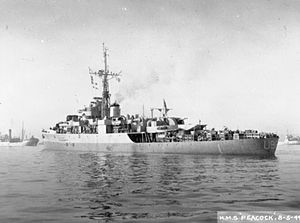HMS Peacock (U96)
This article includes a list of general references, but it remains largely unverified because it lacks sufficient corresponding inline citations. (May 2015) |
 Peacock in 1945 (IWM) A 30695
| |
| History | |
|---|---|
| Name | HMS Peacock |
| Builder | Thornycroft, Woolston, Hampshire |
| Laid down | 29 November 1942 |
| Launched | 11 December 1943 |
| Completed | 10 May 1944 |
| Identification | pennant number U96/F96 |
| Honours and awards |
|
| Fate | Sold for scrap, 1958 |
| Badge | On a Field White, upon a pedestal Black, a Peacock Proper |
| General characteristics | |
| Class and type | Modified Black Swan-class sloop |
HMS Peacock was a modified Black Swan-class sloop of the Royal Navy. She was built for service as a convoy escort during the Second World War, serving in the arctic and Atlantic convoys. After the Second World War she saw service in the Mediterranean. She was scrapped in 1958.[1]
Construction[]
Peacock was built by Thornycroft, Woolston, and was laid down on 29 November 1942, launched on 11 December 1943, and completed on 10 May 1944. She was adopted by the civil community of Tadcaster Rural District Council in the West Riding of Yorkshire as part of the Warship Week National Savings campaign in 1942.
[]
Under the command of Lt.Cdr. Richard Stannard, VC, DSO, RD, RNR,[2] upon commissioning, Peacock completed work ups in home waters. In August 1944 she was allocated for service with the Arctic convoys to Russia. By December 1944, she was allocated for the defence of the Atlantic Convoys. During these operations she took part in the sinking of several U-Boats.
In May 1945, she was allocated for service with the British Pacific Fleet but was transferred to the Mediterranean Fleet as the war drew to a close.
Following the war she remained in the Mediterranean. She received the new pennant number 'F96' and was based in Malta, as part of the 3rd Frigate Flotilla. This Flotilla took part in patrols preventing illegal Jewish immigration into Mandatory Palestine. In June 1953, she attended the Coronation Review at Spithead.[3] In 1954 she was placed in reserve.[4]
She was subsequently sold for scrap and arrived for breaking up at Rosyth on 7 May 1958.
References[]
- ^ Smith, Gordon (2011). "HMS Peacock, Sloop". naval-history.net. Retrieved 21 December 2015.
- ^ "HMS Peacock (U 96)". uboat.net. Retrieved 1 October 2018.
- ^ Souvenir Programme, Coronation Review of the Fleet, Spithead, 15th June 1953, HMSO, Gale and Polden
- ^ Marriott, Leo (1983). Royal Navy Frigates 1945-1983. Ian Allan Ltd. ISBN 978-0-7110-1322-3 p.15
Further reading[]
- Blair, Clay (2000). Hitler's U-Boat War: The Hunted 1942–1945. New York: Modern Library. ISBN 0-679-64033-9.
- Colledge, J. J.; Warlow, Ben (2006) [1969]. Ships of the Royal Navy: The Complete Record of all Fighting Ships of the Royal Navy (Rev. ed.). London: Chatham Publishing. ISBN 978-1-86176-281-8.
- Gardiner, Robert; Chesneau, Roger (1980). Conway's All The World's Fighting Ships 1922–1946. London: Conway Maritime Press. ISBN 0-85177-146-7.
- Gardiner, Robert; Chumbley, Stephen (1995). Conway's All The World's Fighting Ships 1947–1995. Annapolis, Maryland, USA: Naval Institute Press. ISBN 1-55750-132-7.
- Hague, Arnold (1993). Sloops: A History of the 71 Sloops Built in Britain and Australia for the British, Australian and Indian Navies 1926–1946. Kendal, England: World Ship Society. ISBN 0-905617-67-3.
External links[]
- Black Swan-class sloops
- 1943 ships
- Ships built by John I. Thornycroft & Company